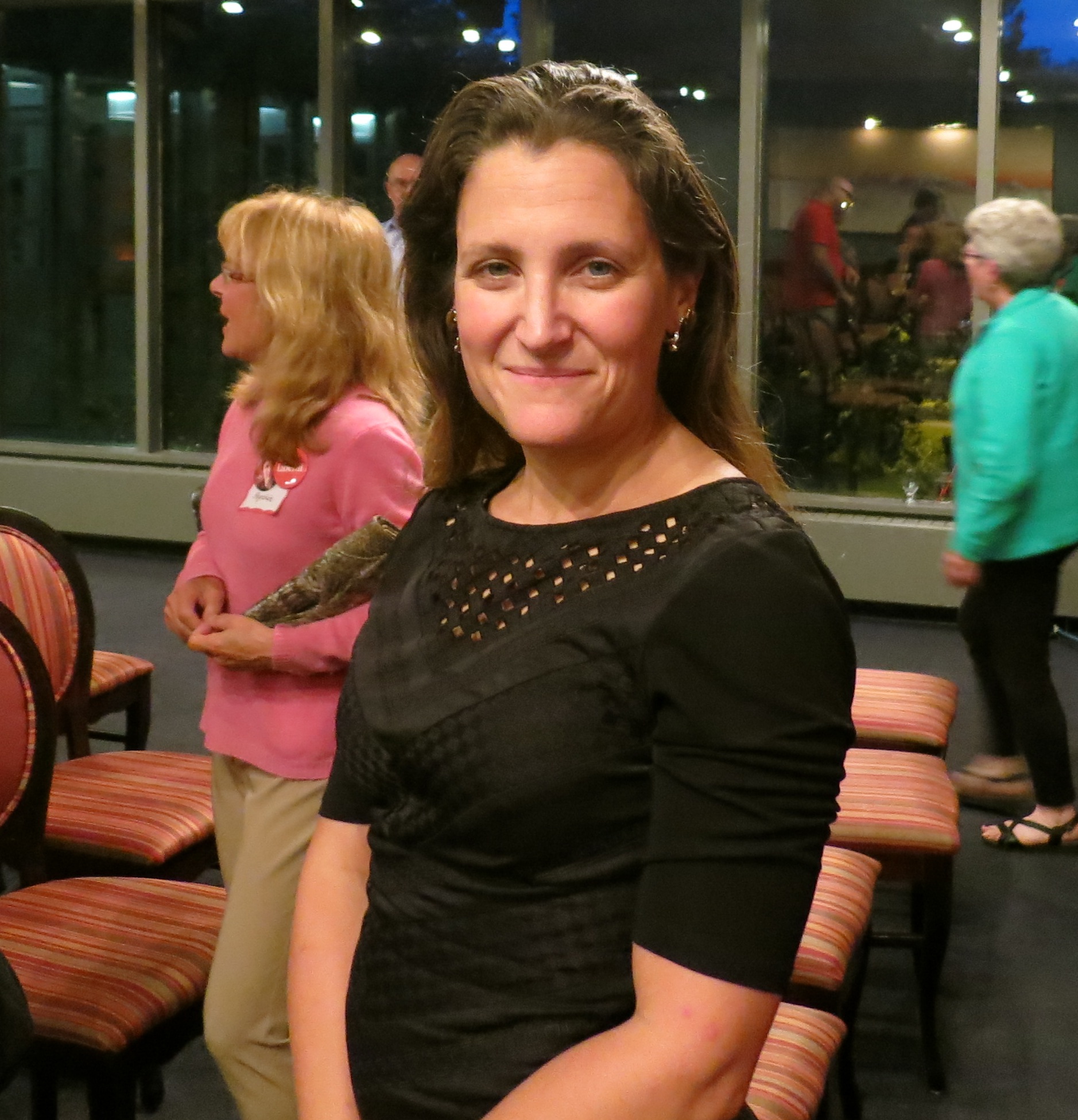EDMONTON
Last Wednesday night, during an engaging talk at the University of Alberta Faculty Club, Chrystia Freeland pretty clearly laid out the arguments for why voters in Edmonton Strathcona should re-elect New Democrat Linda Duncan in the next federal election.
The Toronto MP, who is one of the bright lights of Liberal Leader Justin Trudeau’s caucus, wasn’t aiming to make that point, of course. Indeed, she was actually gamely making the argument to the more than 100 Liberals who spent two hours listening to her remarks why voters should elect Eleanor Olszewski, the Liberal Party of Canada’s standard-bearer in the riding.
As a native of Alberta — born in Peace River and raised here in Edmonton, where she was educated in public schools before attending Harvard and Oxford — Freeland is likely to be to play an important cabinet role if the Liberals manage to form a government. As such, it was bizarre no one from the local mainstream media could be bothered to show up to cover her remarks or even try to get a file photo.
Not everyone is as enthusiastic about Freeland’s potential as I am, by the way. A scion of the Ukrainian-Canadian diaspora, she has been banned from Russia by President Vladimir Putin’s diktat, a retaliatory slight that must get up similarly hostile Harper Conservative noses, pretending, as they do, to be Ukraine’s only friends in Canada.
But at the risk of being mean (Freeland was certainly very nice to me, and kindly posed with me for a photograph), and also of offending my friends in both the Liberal Party and the NDP, the case she so articulately set out is in fact stronger if you replace Olszewski’s name with Duncan’s.
I imagine the recently elected Member of Parliament for Toronto Centre knows all this, although she was too loyal a Liberal to let on, having just won a hard fought by-election against New Democrat Linda McQuaig, who like Freeland is an author, journalist and high-profile and effective spokesperson for progressive Canadians. Both of them deserve to be in Parliament, but, alas, that’s not the way the system works here.
It’s important to all Canadians, Freeland emphasized to start, “not to have the Conservatives form the next government.” Agreed!
She excoriated the so-called Conservative government of Prime Minister Stephen Harper as deeply sexist, profoundly out of touch with the values of Canadians, anti-science and not even able to live up to its No. 1 talking point, “that it is business oriented, business friendly or oriented to business.”
“It’s just not true,” she said, wondering what kind of a pro-business government wants to suppress science and ignore facts. She introduced a nice argument that the Harper Government’s hostility to science is in fact evidence of its lack of business acumen.
So, she argued, is its misunderstanding of the U.S. government and the psychology of President Barack Obama. Harper’s bizarre pronouncement that he won’t take no for an answer from Washington is not likely to be effective, she said, nor is his apparent notion he can exploit Alberta bitumen while ignoring the need for social consent in the United States or elsewhere.
“The fact that Keystone hasn’t been approved is directly the fault of this government,” Freeland stated. “Believing we have to choose between the oil industry and the environment totally misreads the situation,” she went on.
Whether or not you endorse the entire range of views expressed by Freeland, it’s hard for me to argue with her conclusions the Harper Conservatives suffer from “an arrogant sense of righteousness and entitlement” or that allowing them to continue to govern would be deeply harmful to Canada.
Which brings us back to Duncan and Olszewski. In Edmonton Strathcona, Duncan can win, while Olszewski cannot — although Olszewski very well could split the vote sufficiently to ensure a Conservative gets elected.
The arithmetic is pretty simple: if the Liberals do well in Edmonton Strathcona in 2016, the Conservatives will win in the riding, as they have many times in similar circumstances in the past.
If you are simply a party partisan, this doesn’t matter, I guess. For most of us, though, Freeland spoke a profound truth when she said of the Harperites that this is an election in which we simply “can’t let them continue to be our government.”
So this calls for a certain degree of strategic voting, as unpopular as that idea is bound to be with both Liberal and New Democrat true believers. But here too the electoral math is pretty clear: the more seats not held by Tories, the better off the country is.
I think Freeland’s late mother, Halyna Chomiak Freeland, might have agreed with this analysis. After all, she ran for the NDP in Edmonton Strathcona in 1988 and came pretty close to winning.
Regardless, Liberals should hold their noses and vote NDP in Edmonton Strathcona, for the very reasons Freeland ably enumerated.
New Democrats in some other ridings — including, I daresay, Toronto Centre — are going to have to return the favour.
The hard part for many progressive voters is going to be figuring out how and where to cast a strategic ballot — which is seldom completely clear.
It is clear in Edmonton Strathcona, though, and that requires a vote for Linda Duncan, whether it’s strategic or deeply partisan.
As Freeland rightly stated: “We cannot afford in this crucial year to split the progressive vote.”
This post also appears on David Climenhaga’s blog, Alberta Diary.




